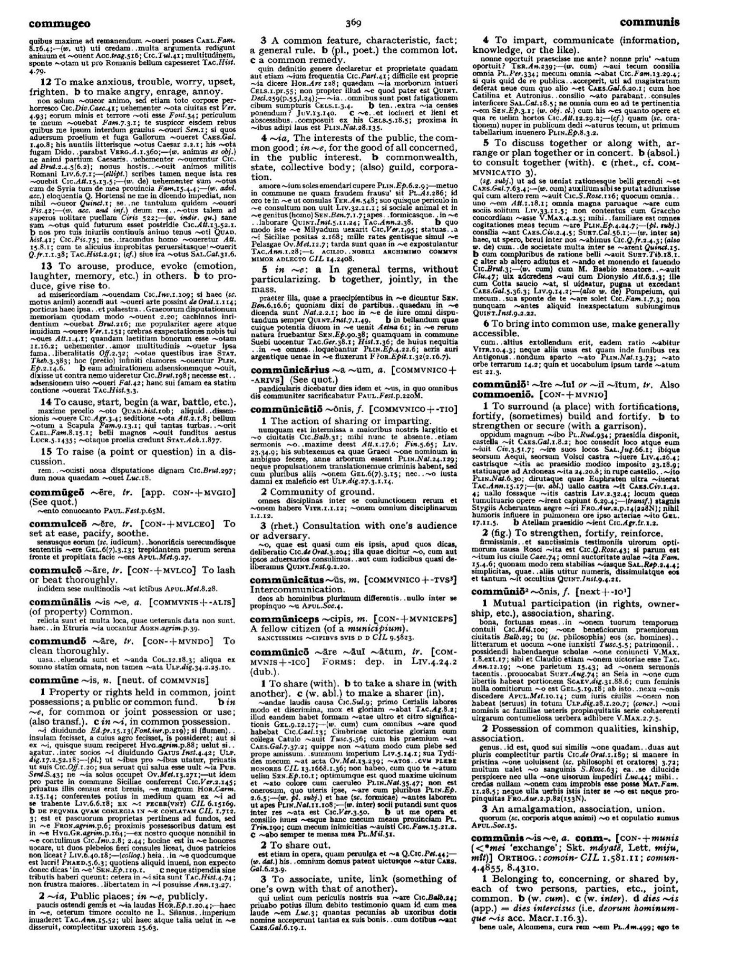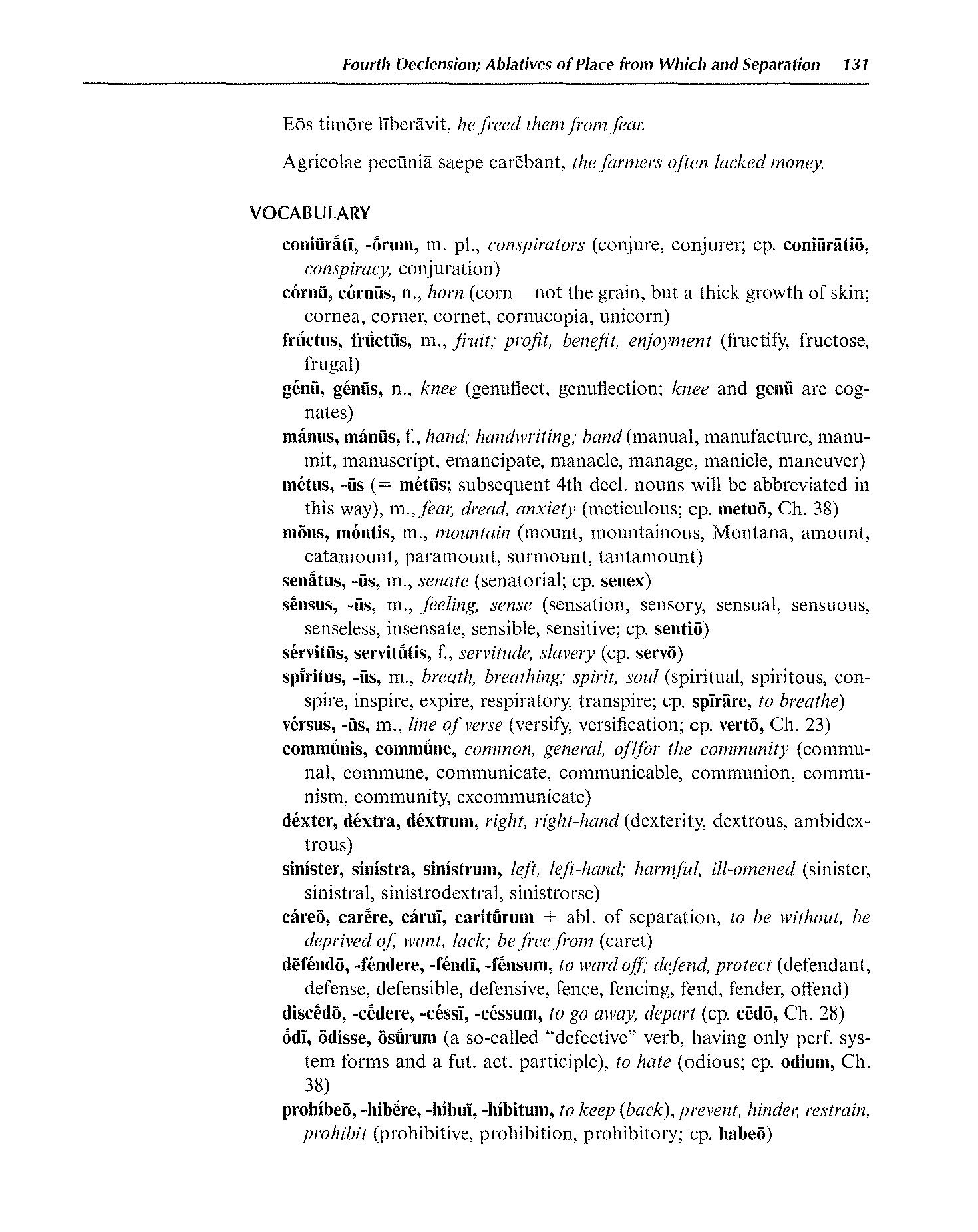
page_listing.tpl
page_subListingDetails.tpl
sub_listingDetails_style1.tpl
sub_listingDetails.title.tpl
commūnis common
commūnis is a Latin Adjective that primarily means common.
Definitions for commūnis
Wheelock's Latin
Adjective
- 1
common, general of/for the community
English derivatives:
communal commune communicate communicable communion communism community excommunicate
Oxford Latin Dictionary
Adjective
- 1
Belonging to, concerning, or shared by, each of two persons, parties, etc., joint, common. (b) (w. cum). (c) (w. inter). (d) dies ~is (app) = dies intercisus (i.e. deorum hominum-que~is acc. Macr.I.I6.3).
- 2
Occupying a middle position, neutral; (also) having the qualities of both sides. (b) (spec. of Mars) impartial. (c) (gram.) having the same form for two cases, genders, voices, meanings; (pros., of syllables) that may be long or short.
- 3
Shared, possessed, used, etc., by all in a particular group. common, general. (b) (w. application limited by gen., dat., etc.). (c) (pl., app) all (in a particular group or class).
- 4
(rhet., of arguments, etc.) That can be used by both sides, applicable to either side.
- 5
Of, belonging to, or affecting, the whole community or state, public, national, communal. (b) locus ~is, a public place; (pl., also) the 'public' parts of a house. (c) sensus ~is, feeling for others in the same community (as a guide to conduct, etc.) (see also senses 6 and 7).
Sentences with commūnis
Latin to English
Communi ... fit vitio naturae, ut inusitatis atque incognitis rebus magis confidamus vehementiusque exterreamur.Compare By common defect of nature, the unusual and the unknown make us either overconfident or overly fearful.
Communis sum hic argumentum alius etiam philosophus.Compare This argument is common to other philosopbers also.
Sentio ego, Scipio, omnis aetas mors sum communis.Compare I have perceived, Scipio, that death is common to every age.
Universus hic mundus sit una civitas communis deorum atque hominum existimanda.Compare We must conceive of this whole universe as one commonwealth of which both gods and men are members.
Hic studium non sum communis Graecia, sed proprius Athenae.Compare This study was not common to Greece, but peculiar to Athens.
Data sources
Notes
- Definitions
- Frederick M. Wheelock, Wheelock's Latin, 6th ed., rev. Richard A. LaFleur (New York, NY: HarperCollins Publishers, 2005): 131.
- P. G. W. Glare, Oxford Latin Dictionary, Vols. 1-8 (Oxford: Clarendon Press, 1982): 369.
- Word frequencies
- Christopher Francese, "Latin Core Vocabulary," Dickinson College Commentaries, last modified 2014, http://dcc.dickinson.edu.
- Paul B. Diederich, The Frequency of Latin Words and Their Endings, PhD diss., (Columbia University, 1939).
- Louis Delatte, Suzanne Govaerts, Joseph Denooz, and Etienne Evrard, Dictionnaire fréquentiel et index inverse de la langue latine [Frequency Dictionary and Inverse Index of the Latin Language] (Liège, Belgium: Laboratoire d'analyse statistique des langues anciennes de l'Université de Liège [L.A.S.L.A.], 1981): 123.
Bibliography
Allen, Joseph H. Allen and Greenough's New Latin Grammar for Schools and Colleges: Founded on Comparative Grammar. Edited by James B. Greenough, George L. Kittredge, Albert A. Howard, and Benjamin L. D'Ooge. Boston, MA: Ginn & Company, 1903.
Crystal, David. A Dictionary of Linguistics and Phonetics. 6th ed. Oxford, UK: Blackwell Publishing, 2008.
Delatte, Louis, Suzanne Govaerts, Joseph Denooz, and Etienne Evrard. Dictionnaire fréquentiel et index inverse de la langue latine [Frequency Dictionary and Inverse Index of the Latin Language]. Liège, Belgium: Laboratoire d'analyse statistique des langues anciennes de l'Université de Liège (L.A.S.L.A.), 1981.
Diederich, Paul B. The Frequency of Latin Words and Their Endings. PhD diss., Columbia University, 1939.
Francese, Christopher. "Latin Core Vocabulary." Dickinson College Commentaries. Last modified 2014. http://dcc.dickinson.edu/latin-vocabulary-list.
Gildersleeve, Basil L., and Gonzales Lodge. Gildersleeve's Latin Grammar: Third Edition, Revised, and Enlarged. 3rd ed. London, England: Macmillan and Co., 1903.
Glare, Peter G.W. Oxford Latin Dictionary. Vols. 1-8. Oxford, England: Clarendon Press, 1982.
Krüger, Bernd. "Latin Conjugation Tables." Cactus2000. Accessed May 5, 2023. https://latin.cactus2000.de/index.en.php.
Pierson, Nick. "Sound of Text." Accessed October 26, 2019. https://soundoftext.com.
Wheelock, Frederick M. Wheelock's Latin. 6th ed. Revised by Richard A. LaFleur. New York, NY: HarperCollins Publishers, 2005.
Wiktionary Contributors. "Victionarium." Wikimedia Foundation, Inc. Updated March 18, 2019. https://la.wiktionary.org/wiki/Victionarium:Pagina_prima.
Citation
Chicago (17th ed.)
Allo Contributors. "commūnis, commūne (adj.) - Latin Word Definition." Allo Latin Dictionary. Last modified . Accessed February 20, 2026. http://ancientlanguages.org/latin/dictionary/communis-commune.
Entry created on . Last updated on .








